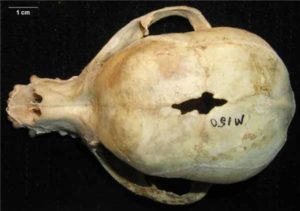Chihuahua Health
When we speak of Chihuahua health issues, the attention must be oriented towards the owner. The health of your Chihuahua is your responsability and something you must monitor. Although some health issues are caused by genetics, most diseases and sickness can be avoided through proper diet and exercise. But even when you treat your dog with care and love it is possible that he/she gets sick. If your dog gets sick it’s important to isolate him/her from other dogs. This is important to avoid spreading the disease until the cause can be determined by a veterinarian.
Chihuahua Vaccination
Chihuahuas are a relatively healthy breed although they are still susceptible to some health problems. As the risks of diseases outweigh the risks of getting your dog vaccinated it is always recommended to do so. We always advise to get your dog vaccinated at a veterinarian as smaller dogs have a greater chance of going into anaphylactic shock compared to bigger dogs. Chihuahua health issues are sometimes related to genetics but those which are not should be handled/prevented by the owner. Find a good vaccination schedule on PetWebMD.


Known Chihuahua health issues
Chihuahua & Molera
Human babies have gaps with soft tissue in between their skull, this also known as a fontanelle. These soft spots dissapear as the skull develops and the different bones join together. Chihuahuas have the same ‘hole’ in their head called a molera. Although this might sound contradictory this molera is still mentioned as a mark of breeding purity. This molera is often associated with hydrocephalus by beginner breeders. Hydrocephalus is very different from a molera as it is marked by the accumulation of fluid within the brain. A study conducted by Greene and Braund in 1989 concluded that there appears to be no relation betweeen the presence of a molera and the presence of hydrocephalus.
To know if your Chihuahua has a molera you put your finger between their eyes on gently move upwards. If you feel a soft spot that feels different from the skull (like a small gap) your Chihuahua probably has a molera. A molera is no health concern as it is the trait of a pure bred Chihuahua. It is however important to not drop your Chihuahua on its head as it is more prone to brain injury. Also try to reduce the rough playing to a minimum.

Blood Diseases – Anemia
Blood exists out of red and white blood cells, blood platelets and plasma. Plasma in its turn exists out of water, proteins, hormones, antibodies and other chemical compounds. Rode and white blood cells are made in the bone marrow. Rode blood cells that transport oxygen and typically reside within the spleen. White blood cells primary role is to defend the body against viruses, bacteria and diseases.
A lack of red blood cells is called anemia and can be caused by different reasons, this is a common issue when discussing Chihuahua health. Find out blood related chihuahua health problems, symptoms and treatments on the ‘Chihuahua blood diseases‘ page.
Liver diseases
The liver is an important organ in the body of the dog. It is responisble for a large number of important functions such as; processing toxins, role in blood clotting, process food and store glucose, aid in digestive system. Often research is necessary to determine the exact cause of the liver problems. Blood analysis can indicate the presence of enzymes that indicate whether the liver functionality is damaged. On the other hand blood tests can also show low ureum and/or glucose levels which indicate that the lever has been compromised.
If blood tests point into the direction of the disease of Cushing then additional tests are necessary. Whether treatment will be effective depends largely on how far the liver has already been damaged. Chihuahua’s with an acute liver problem need to be taken to the hospital to be hooked up to an infusion. In order to retainstrength it might be necessary to switch to premium food that contains a lot of proteins. Treatment with antibiotics, vitamin B and/or anti-inflammatory drugs.
Find a table with the different types of liver diseases, their symptoms and treatment on the ‘Chihuahua liver diseases‘ page.
The respiratory tract (system) consists of the nasal passages, the larynx, the trachea, the lungs and all the connections between these. Its main function is to regulate the supply of oxygen to the body and to get rid of the nitrogen. The organs in the body need oxygen in order to function, the heart pumps oxygen from the lungs to other parts of the body.
If you notice coughing, panting, sneezing, choking or general weakness, your dog might have an issue with its respiratory system. Of course, other issues could cause this symptom. Ideally, you would need to go see the vet to figure out what your four-footer is missing.
Find out which ones, symptoms and treatments on the ‘Chihuahua respiratory‘ page.

Kidney diseases
Health issues – not only for Chihuahuas but for all dog breeds – are often located in the kidneys. The most important role of the kidney is to regulate the amount of liquid and minerals in the body. The kidneys determine how much liquid and minerals are excreted through the urinary system and how much is kept into circulation. The kidneys are also responsible to filter toxic substances out fo the body by excreting it through the urinary tract. And finally, they are also an important organ as they produce the chemical substances necessary to produce new red blood cells.
When faced with kidney diseases a dog is often put on an infusion system in order to filter out harmful substances from the body. In case of infections, the vet will often prescribe antibiotics. Because the kidney is not functioning well the vet has to be careful with what to prescribe because medications all have to be processed by the kidney. In more severe cases it might be necessary to operate in order to remove tumours or kidney stones.
Find a table with the different types of liver diseases, their symptoms and treatment on the ‘Chihuahua liver diseases‘ page.

Common for genetic Chihuahua health issues are the bones, tendons and muscles. The bones are the foundation of any dog and give it strength and sturdiness. When a Chihuahua flexes its muscles, bones are put into position so that it can move its limbs. The brain is connected with the muscles via the nerves which it uses to control which muscles need to be flexed. That is why sometimes neurological problems can affect the muscoskeletal system of a dog.
As for all dogs, Chihuahuas can have significant muscle or bone issues. The main problems that arise for Chihuahua’s are; broken bones – mainly ribs or legs, dislocations or torn ligaments and dysplasia.
Find a full list/table of possible issues, symptoms and treatments on the ‘Chihuahua bone diseases‘ page.
Heart diseases
The heart is located in the middle of the chest and is a muscles that pumps blood around. The heart exists out of 2 areas, one to pump blood to the lungs to pick up oxygen, the other half pumps oxygen rich blood to other parts of the body. Chihuahua’s are not specifically known to have more heart issues. However, every living animal can have heart diseases or issues which need treatment.
Find a full list/table of possible issues, symptoms and treatments on the ‘Chihuahua heart diseases‘ page.
Chihuahua Digestive track
Part of the Chihuahua health issues is the digestive system. The digestive tract starts in the mouth where food is mixed with saliva which contains digestive enzymes.

In the stomach, food is processed into even smaller bits of food that pass to the duodenum. In here enzymes from the pancreas and gal from the liver come together to start a process that breaks the food down to fats, sugars and proteins. In a final step, faeces are excreted through the rectum.
If your Chihuahua shows the following symptoms it might have a problem with its digestive tract:
- Loss of appetite
- Loss in weight
- Problems with swallowing
- Throwing up
- Swollen belly
- Flatulence
- Diarrhoea
- Constipation
In order to diagnose digestive tract problems, you need to consult with your local vet. If you want to take a look yourself, you can start with the full list/table of possible issues, symptoms and treatments on the ‘Chihuahua digestive system‘ page.
Now that we have discussed the possible Chihuahua Health issues, make sure to read the Chihuahua Care – where we discuss how to care for your Chihuahua on a daily basis.